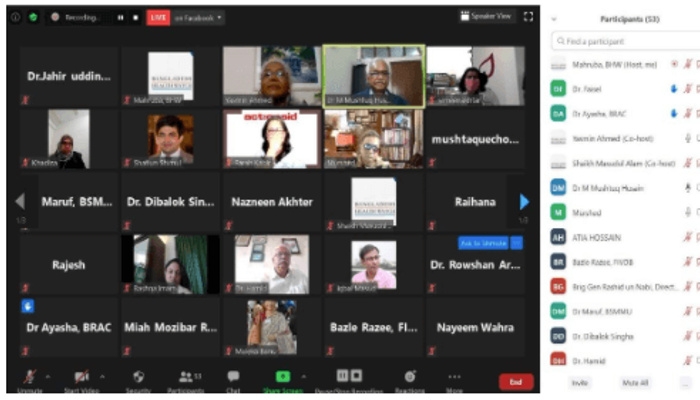

Bangladesh Health Watch (BHW), a citizens’ platform for improved accountability of the country’s healthcare system through evidence based policy review and citizens’ feedback, held a webinar on 11 the January to discuss the National Deployment and Vaccine Plan’ COVID-19 vaccine(s). The purpose of the webinar was to share with experts the details of the Plan and identify areas which need to be further addressed to strengthen the Plan.
Dr. Ahmed Mushtaque Raza Chowdhury, the Convener of BHW, opened the webinar with a reflection of Bangladesh’s Covid situation; Dr Yasmin H Ahmed, Advisor to BHW, moderated the event. The keynote paper was presented by Dr. Mushtuq Husain, Adviser, IEDCR who outlined highlights of the Vaccine Deployment Plan. The following panelists provided their feedback:
Dr. Farah Kabir, Country Director, Action Aid Bangladesh
Dr. Shafiun Shimul, Associate Professor, Institute of Health Economics, Dhaka University
Dr. ABM Akhter Hamid, Public Health Specialist, WHO
Barrister Rashna Imam, Managing Partner, Akhtar Imam & Associates and member of Advisory Group, BHW
Dr. Rubaiul Murshed, Founder, ‘Shomman’.
The participants appreciated comprehensiveness of the Plan and the details which have been considered in designing the roll out of the vaccination programme. The participants especially appreciated the following points:
The government had pro-actively started the work of developing the Plan early on and even before the vaccines were approved
The Plan was comprehensive and covered important aspects of such a massive programme
They acknowledge that the Plan would be a living document and will be revised as new knowledge/experience comes through
Attention was given to logistics issues related to vaccine distribution and management
The consultative approach adopted for developing the Plan as well as implementing roll-out.
However there are certain areas which need further consideration and strengthening:
There is a need for equity to be addressed more strongly so that the underserved/ disadvantaged/ hard-to-reach populations receive required attention
Attention would need to be paid to disseminating the right information to the general public. The dissemination should address the rumors/myths around the vaccine(s) and how to access vaccination. The information needs to be disseminated through formal and informal channels, using multiple media and with strong involvement of relevant ministries, e.g. Ministry of Information.
A strong volunteers’ force would be needed to mobilise communities and organize their movement to health centres. These volunteers should be properly trained and their contribution recognized in an appropriate way
Vaccinators should be properly trained- a task which has already been started
The groups mentioned in the priority list should be revisited to include those who are in situations where they can potentially spread the virus- e.g. kitchen market sellers; and exclude groups which are at lower risks
The price should be carefully determined so that it does not become barrier to access
The private sector should be allowed to play a role- this will reduce the burden on government and also ease access to the vaccine by some parts of the society
The government should take initiatives to control any sorts of corruption regarding the vaccination programme
Women and CSOs should be included within all levels of coordination committees
Litigation issue: The deployment plan should not conflict with our constitution (Article 15 & 18))
Roaster for service providers: There is a clear roaster plan to avoid service interruption because after taking the vaccine there is an interval for two – three days to observe the post vaccine illness if any. Therefore, continuity of the service a roaster plan is needed to avoid the service interruption.
Engagement of civil societies in execution of the deployment plan to reduce the rumors and panic. Informed consent is needed and post vaccine illness management is also important to control rumor and to create a trust on the vaccination program countrywide.
Civil society engagement is important to enroll the registration of the rural and urban marginalized people for vaccination
Initiate research to understand public demand and interest about the vaccine
Government should explore the opportunity to collect all other effective vaccine candidates besides the Serum Institute
Government should explore the opportunity to do the 3rd phase trial of any suitable vaccine candidate (e.g 1 dose vaccine of Johnson & Johnson)
With proper monitoring and strict guideline government should allow private sector to import vaccine
Government can take support of BRAC cold storage to store the vaccine
Snapshot of media coverage
The event was able to attract some media attention as media personnel joined the programme.
|
Sl. |
Newspaper |
Headline |
|
|
English Newspaper |
|||
|
1 |
The Business Standard |
BHW holds webinar on national deployment, vaccine plan for Covid-19 |
|
|
2 |
The Daily Observer |
|
|
|
3 |
Daily Sun |
Webinar on NDVP for Covid-19 vaccine held |
|
|
4 |
Dhaka Tribune |
Covid-19 vaccination: Age to get priority over comorbidity |
|
|
5 |
Business Insider |
Misinformation about Covid 19 vaccines should be addressed: Experts |
|
Closing remarks:
Bangladesh Health Watch, as a civil society watchdog will continue to monitor the scene as the programme is rolled out and will continue to bring together expert groups to collect expert suggestions and help support the government in this important venture. The moderator concluded the webinar with a vote of thanks.
Citizen's Voice